|
|
|
Sort Order |
|
|
|
Items / Page
|
|
|
|
|
|
|
| Srl | Item |
| 1 |
ID:
122826
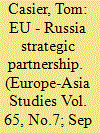

|
|
|
|
|
| Publication |
2013.
|
| Summary/Abstract |
Russia-EU relations have often been presented in terms of a normative gap, with the EU appearing as a normative and Russia as a non-normative actor. This article critically analyses this 'normative argument' which sees this gap as the cause of tensions. Pleading for a less dichotomous approach to norms and interests, it challenges the normative argument on the basis of the assumed congruence between the norm-driven input and norm-promoting output of European foreign policy. As an alternative, the article explores how the normative agenda in Eastern Europe serves instrumental purposes. Selective norm promotion has the potential to change the hierarchy of identities among post-Soviet states.
|
|
|
|
|
|
|
|
|
|
|
|
|
|
|
|
| 2 |
ID:
130862
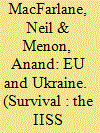

|
|
|
|
|
| Publication |
2014.
|
| Summary/Abstract |
EU members did not take long-standing Russian positions seriously, assumed any neighbour would be eager to sign up for 'more Europe', and have failed to generate a viable reply to Moscow's intervention. Events in Ukraine represent the most significant security crisis in Europe since the collapse of the Soviet Union. The Geneva accord of April this year, intended to secure de-escalation, has been violated by Russia, by 'local' forces in eastern Ukraine and, arguably, by the Ukrainian government itself. Russian Foreign Minister Sergei Lavrov has warned that Russia will defend its interests in eastern Ukraine, if necessary with attacks similar to those in Georgia in 2008. Small US deployments are occurring in the Baltics and Poland. Russia has resumed military exercises near the frontier with Ukraine. The escalatory dynamic is clear.
|
|
|
|
|
|
|
|
|
|
|
|
|
|
|
|
| 3 |
ID:
132698
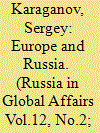

|
|
|
|
|
| Publication |
2014.
|
| Summary/Abstract |
Debates over the ongoing crisis in relations between Russia and the West revolve around the incorporation of Crimea, the global reaction to that move, and the future configuration of the Ukrainian state if, of course, it manages to survive (and I hope it will). But I contend that these are not the primary issues in global terms. There are other crucial questions. The first is what the European security system will be like. I repeat: the Old World was not allowed to withdraw from the Cold War, and now it may see a new round of tension. The second important question is whether Russia will be able to overcome the impasse in its development, in which it found itself after it restored statehood at the end of the 2000s. The third and closely linked question is whether Russia will wish to remain part - even an independent and very special partner - of Europe or will it opt for cultural-civilizational isolation and increasingly lean towards the East economically. It is obvious that Russia is firmly determined to change the rules of the game that have been dictated to it for the past twenty-five years. Unable and reluctant to toe the line, Russia has given up attempts to become part of the West.
|
|
|
|
|
|
|
|
|
|
|
|
|
|
|
|
| 4 |
ID:
100599
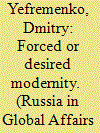

|
|
|
| 5 |
ID:
132699
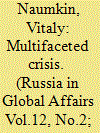

|
|
|
|
|
| Publication |
2014.
|
| Summary/Abstract |
The impact of the Ukrainian crisis on the existing world order proves to be so manifold that it is hard to predict its consequences, irrespective of its outcome. This short article touches upon only a few aspects of the problem.
|
|
|
|
|
|
|
|
|
|
|
|
|
|
|
|
| 6 |
ID:
132697
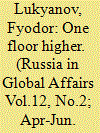

|
|
|
|
|
| Publication |
2014.
|
| Summary/Abstract |
It is already becoming habitual: yet another turn in world politics - and a fondly prepared portfolio of materials has to be shelved, and new ones made in an emergency mode. Witnessing epoch-making events is fascinating, but it takes a lot of nerve…
The period from February to April 2014 marked the sharpest turn in history since the end of the Cold War. We have witnessed the actual collapse of the Ukrainian statehood which emerged after the abolition of the Soviet Union, Crimea's entry into the Russian Federation, and an upsurge in confrontation between Moscow and the West. No wonder life made us revise our plans and devote the entire issue of Russia in Global Affairs to the changes which someone has already dubbed "Russian spring."
|
|
|
|
|
|
|
|
|
|
|
|
|
|
|
|
| 7 |
ID:
117365
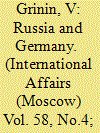

|
|
|
|
|
| Publication |
2012.
|
| Summary/Abstract |
International Affairs: Germany plays the role as a chief integrator and, amid the ongoing crisis, also a chief donor in the EU. What is the country's position in the European orchestra insofar as concerns the expansion of cooperation with Russia?
V. Grinin: Taking into account the strategic nature of Russian-German cooperation, we would like to hope that the current strengthening of Germany's role within the EU - not only in the financial and economic sphere but also in building up the substance of a common EU foreign policy - will help advance Russia-EU cooperation in its entirety. It is also important to note that today on the majority of issues related to Russia-EU relations many EU countries to some degree or other orient themselves toward Germany's position. In any event, all of them seek to take it into account. This may open additional opportunities within the framework of the Russia-EU dialog.
|
|
|
|
|
|
|
|
|
|
|
|
|
|
|
|
| 8 |
ID:
131190
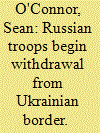

|
|
|
|
|
| Publication |
2014.
|
| Summary/Abstract |
Russian forces close to Ukraine's border appear to be drawing down or relocating, HIS Jane's satellite imagery analysis indicates
|
|
|
|
|
|
|
|
|
|
|
|
|
|
|
|
| 9 |
ID:
132704
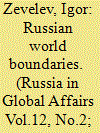

|
|
|
|
|
| Publication |
2014.
|
| Summary/Abstract |
Until spring 2014, discussions about the new Russian national identity, including the Russian world concept, had little to do with Russia's foreign policy and national security agenda. The revolution in Ukraine made it one of the issues critical for the survival of the Russian nation and statehood.
|
|
|
|
|
|
|
|
|
|
|
|
|
|
|
|
| 10 |
ID:
130861
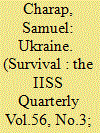

|
|
|
|
|
| Publication |
2014.
|
| Summary/Abstract |
The ugly truth is that Moscow can still undermine any Western plan for Ukraine's future. The crisis is likely to lead to a period of sustained disequilibrium and instability. As Ukraine's winter of domestic discord transformed into a spring of territorial partition and instability, European and American officials seemed to be speaking from an agreed set of talking points in their public remarks on the crisis. While hopeful transatlanticists sought to construe this remarkable consistency as a demonstration of a new seriousness of purpose in the West, the litany of warnings, threats and prescriptions for resolution (inevitably characterised as either an 'off-ramp' or 'de-escalation') spoke more to the desperation of those uttering them to quickly find a new, stable equilibrium for Ukraine, Russia and the international system. Yet the talking points and buzzwords, no matter how many times they are repeated, do not in fact describe either a sustainable equilibrium or an end point to the crisis. Instead, the disequilibrium and instability of the Ukrainian crisis seem likely to endure for some time: the search for a 'new normal' promises to be long, costly and highly disruptive of both individuals' lives and the international order.
|
|
|
|
|
|
|
|
|
|
|
|
|
|
|
|
| 11 |
ID:
130858
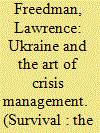

|
|
|
|
|
| Publication |
2014.
|
| Summary/Abstract |
Crisis management is the most demanding form of diplomacy. So far neither Russia nor the US and its European allies have handled it particularly well. Half a century ago, after the conflicts over Berlin and Cuba, a new term of art came into vogue: 'crisis management'. American Secretary of Defense Robert McNamara was even quoted as saying that crisis management had taken over from strategy.1 A small literature came to be devoted to the subject. In a number of respects, the term and the key themes it invoked were behind much of the debate on security policy for the remainder of the Cold War.2
The term 'crisis' comes from a Greek word indicating choice or decision, and came to refer to the turning point in a disease. The crisis was the moment when the fever reached a peak and the patient was either going to get a lot worse or a lot better. It is the moment usually marked in TV dramas by delirious patients, caring nurses, anxious relatives and lots of patting down of sweating foreheads with cold sponges. The idea of an international crisis has the same sense of stress and urgency. It means a conflict has come to a head, normally because one side has taken a bold but provocative initiative. At the moment of crisis, some big, long-standing conflict is about to be resolved, either through last-minute diplomacy or by force. The drama comes from a deadline, perhaps reinforced by an ultimatum, and intense media attention. On the news channels, the moment is usually marked by late nights in the corridors of power, emergency summits and tense United Nations Security Council meetings, while staying on the alert for military mobilisations and movements. Leaders of major powers would be expected to show that they had the temperament and character for a crisis. A steely resolve and calm judgement would be at a premium. This was the point of Hillary Clinton's famous challenge to candidate Barack Obama in 2008 as to how he would cope when 'it's 3 a.m. and your children are safe and asleep. But there's a phone in the White House and its ringing. Something's happening in the world.
|
|
|
|
|
|
|
|
|
|
|
|
|
|
|
|
|
|
|
|
|